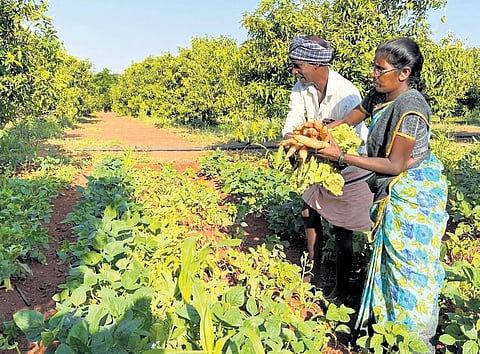

GUNTUR: With natural farming spreading its roots in Andhra Pradesh, over 8.9 lakh farmers in the State are witnessing a transformational change under the community managed natural farming (APCNF) programme implemented by the Department of Agriculture, Government of AP. Recently, it achieved national recognition by winning three Jaivik India Awards.
Making it global, Narayanappa, a marginal farmer of the APCNF programme from the State, was selected for Karmaveer Chakra Award (Bronze) and REX Karmaveer Global Fellowship 2023-24 instituted by the Indian Confederation of NGOs (iCONGO), in partnership with the United Nations. He will receive the award at a programme in New Delhi on November 27. His wife Parvathi is behind Narayanappa’s success in natural farming. By adopting the ‘Any Time Money’ model, Narayanappa has achieved a significant transformation. The 42-year-old farmer hailing from Mallapuram village in Anantapur district, owns a two-acre land holding, which is located in a semi-arid tropical region.
Due to insufficient rainfall and persistent drought-like conditions, agriculture had become a challenging task, and Narayanappa’s family plunged into financial trouble. Observing this, the APCNF district project manager organised several awareness programmes to encourage farmers to switch to natural farming. Narayanappa is among many farmers, for whom natural farming has been life-changing.
Recounting his experiences, Narayanappa in a telephonic conversation with TNIE, said, “In 2016, agriculture officials visited our village and guided us to reevaluate the traditional farming practices. They provided in-depth insights into on-farm natural farming practices, emphasising plant diversity to cover the soil with crops 365 days, minimal disturbance of soil, using biostimulants as necessary catalysts, diverse crops numbering 15-20 in the same land, integrating animals into farming, increase the diversity of organic residues, pest management through better agronomic practices, botanical extracts, which help farmers cultivate nutritious food and increase their profits.”
Since then, there has been no stopping. Narayanappa replaced chemical-based fertilisers and pesticides with home-prepared Kashayams and Jeevamruthams, which act as biostimulants, soil microbial enhancers and bioinoculants that help increase soil fertility. As these biostimulants are prepared using cow dung, kitchen waste and other natural materials, the investment cost has come down significantly.
“Earlier, I used to raise the groundnut crop with chemical inputs and get a low yield of six to seven bags per acre. After switching to natural farming, I have been cultivating over 20 different crops, including tubers like radish, beetroot, carrot, and other crops like maize, cluster beans, and black-eyed beans, besides leafy vegetables. We opted for millets as the border crop to control pests and insects. Now, I don’t have to wait for Kharif or Rabi season for crop harvest as I have been getting regular income,” he explained.
It needs an average investment of over Rs 30,000 per acre to raise crops, using chemical inputs, but in natural farming, we spend less than Rs 5,000 to Rs 6,000 and earn an income of Rs 2 to Rs 3 lakh in the long run, he added. Rythu Sadhikara Samstha Vice-Chairman T Vijaya Kumar said, “It is a proud moment for AP. Many farmers like Narayanappa have achieved year-round food security, financial stability, freedom from debts, and good health for themselves and their families by adopting natural farming.”